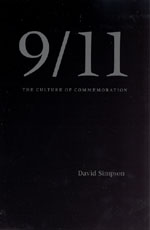David Simpson, from 9/11: The Culture of Commemoration
The dissemination of a war against terror has depended on a locution full of historical and contemporary ironies, for terror began its lexical life as the policy of the state, and wars are traditionally waged by states, so the war against terror can be (and has been) deciphered as the war of the state against itself. But international events are not the only sources of interruption of or distraction from the working out of memorial vocabularies for the dead of 9/11. There is also the ongoing negotiation between commerce and commemoration at the WTC site, a process that pits the declared obligations of memory and due respect against those of a future civic life, both economic and cultural. It is easy to cast the moguls of Manhattan as insensitive and materialistic, but the memorial process has also been aggressively suborned by the politicians, whose avowed respect for the dead is not beyond suspicions of present and future self-interest. Debates about the use of the site have not been unmarked by the assumption that the dead should bury the dead and thus by an embarrassingly hasty inclination to get on with life. Many residents have made it clear that they do not wish to live in a national memorial emptied of retail, full of tourists by day and deserted by night. On the other side, melancholic extremes can also be identified among some of the survivor families and other involved groups who want the site to remain always a shrine to the departed.
. . . .
The event we call 9/11 has a past that we can rediscover, a present that we must monitor, and a future we can project. Many of us who were addressing even the most circumscribed of publics—our students or fellow academics—felt the urge, in the immediate aftermath of September 11, 2001, to make a statement, to testify, to register a response, to initiate some sort of commemoration. Many of those responses to the form of grief, sorrow, shock, and above all, self-recrimination at the appearance of carrying on as before. The rhetoric veered wildly between sympathy and self-importance—as if it were a moral duty that each of us should speak—but what was notable was the need to register awareness of some sort. Many people all across America, not only those who knew one of the dead or knew someone who knew someone, reported feelings of acute personal anxiety and radical insecurity, but there was never a point at which this response could be analyzed as prior to or outside of its mediation by television and by political manipulation. With the passage of time it may come to appear that 9/11 did not blow away our past in an eruption of the unimaginable but that it refigured that past into patterns open to being made into new and often dangerous forms of sense.
—from 9/11: The Culture of Commemoration by David Simpson (2006)
